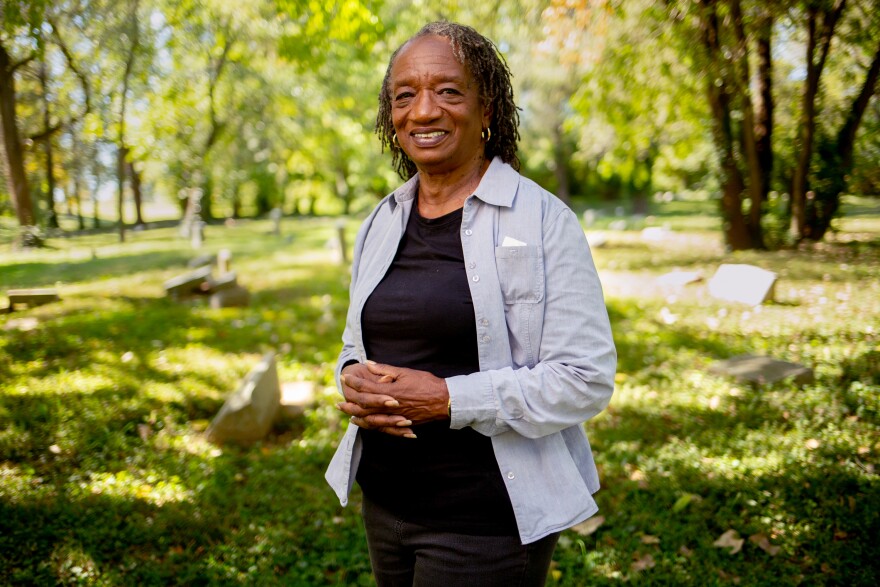Historian Etta Daniels has spent 23 years walking through Greenwood Cemetery in Hillsdale.
She started volunteering at the cemetery after trying to locate her great-grandmother’s grave.
Since then, she's spent countless hours maintaining the property, putting the predominantly Black cemetery on the National Register of Historic Places and handling 50,000 burial records of enslaved people, Black cavalry troops called Buffalo Soldiers, teachers and many others.
Daniels also led the charge to help erect a monument where Harriet Robinson Scott, Dred Scott’s wife, was buried. The couple sued separately for freedom, and their cases led to the U.S. Supreme Court’s 1857 decision that held that Black people cannot be considered U.S. citizens and have no rights under the Constitution. It was overturned 11 years later by adoption of the 14th Amendment, which made all persons born or naturalized in the United States citizens.
“For many many years, people said they had no idea where she was buried,” said Daniels, who doesn’t want Harriet Robinson Scott’s legacy to be a footnote in American history. “We have burial records that say she was buried here, but that’s another indication of how undervalued our history is. They can figure out where Dred was in Calvary [Cemetery], but no one seems to know.”

The Griot Museum of Black History is making sure Daniels and 12 other Black women who shaped the St. Louis region aren’t forgotten either.
The museum’s Black HerStory initiative will honor the contributions of Black women with monuments across the region. The Griot team will work with honorees and communities to place the monuments, called memory markers, where the honorees spent most of their lives, started their careers or grew up.
Daniels said she’s honored by the recognition, even though it’s something she didn’t expect.
“I'm not a doctor or a judge or the mayor of the city or anything like that so it just seemed like my little portion was very, very small,” Daniels said. “But then I thought about that too and said you know, even the tiny pieces are necessary.”
The Griot leaders selected the honorees from more than 100 women before arriving at 13. Each year the Griot will add more women to honor along with “ancestors” who have died. The memory markers allow Griot leaders to honor women whose careers have shaped many lives, said Lois Conley, founder and executive director of the Griot Museum of Black History.
"[Black history] has never gotten its due in larger society, but it's even more true for Black women,” Conley said. “You don't have to be some special person to do this work, you have to be someone who cares about our history and our culture.”

Philadelphia nonprofit Monument Lab will fund the first phase of the project through a $100,000 grant. Its Re:Generation project aims to rethink monuments across the country. Organization leaders looked through data documenting tens of thousands of monuments across the country and found many honor white men and military officials.
The stories of people of color and low-ranking soldiers don’t always get the most attention, said Sue Mobley, Monument Lab’s director of research.
“The people on the ground who make history through their actions, who take the risks, take the fall, who take the harm are very rarely celebrated,” Mobley said. “All of the Re:Generation projects flip that on its head and they’re celebrating collective action and everyday people.”
Monument Lab’s Re:Generation project is reexamining the role of monuments in 10 locations across the country. Mobley said the Griot’s pitch stood out for its approach to honor people who are actively making a difference in the region.
“The public sphere should reflect who is holding up communities, who is supporting the people around them, but also that we should give people their flowers while they're here,” Mobley said. “We are too often mourning and remembering when someone's gone.”
It’s one of the reasons the Griot nominated Ollie Stewart, founder and executive director of Southside Wellness Center, which has catered to seniors across the St. Louis area for about 45 years. Stewart started the organization after noticing older people in her community didn’t have cars or people to take them to doctor's appointments. Workers regularly drive seniors to appointments, provide flu and COVID vaccines and a place for them to socialize.

“I feel it is important for my grandkids, for my family members and for other young black women,” Stewart said. “Our history has not been told. And it will never be told unless we tell it.”
The next phase of the project will include raising money to support installations of the first memory markers on the grounds of the Griot Museum in 2023 and throughout the region. It will coincide with a public installation by architect David Adjaye, the designer of the National Museum of African American history in D.C., who will build a public installation outside the museum.
Conley also will be recognized. The Griot’s team nominated her to be included in the inaugural class of honorees.
For Conley, the works are a dream come true and part of a 25-year effort to expand the museum and share the region’s Black history.
“This is going to bring a lot of national attention to the Griot, attention that we probably wouldn't have gotten at this level without that,” Conley said. “To be able to say we have the monument project supporting the Herstory activity as well, I just think it's just gonna be wonderful for the Griot, finally, to get that kind of attention.”

The honorees include:
Etta Daniels, historian at Greenwood Cemetery Preservation Association
Barbara Bowman, vice president and controller of the Urban League of Metropolitan St. Louis
Adelia Parker-Castro, multimedia artist and arts educator
Anne-Marie Clarke, former St. Louis family court commissioner
Bonita Cornute, broadcast journalist and media specialist
Kendra Holmes, chief operating officer at Affinia Healthcare
Tishaura Jones, mayor of St. Louis
Traci Berry-McGhee, motivational speaker
Sandra Moore, community development and human services executive
Edna Hanks Pipes, educator
Jamala Rogers, author and social activist
Ollie Stewart, executive director of Southside Wellness Center
Lois Conley, founder and executive director of the Griot Museum of Black History





